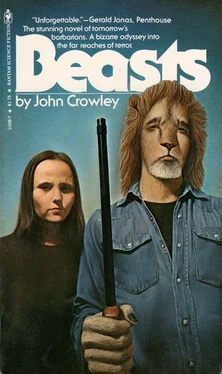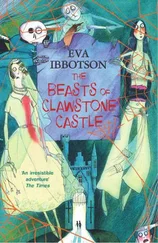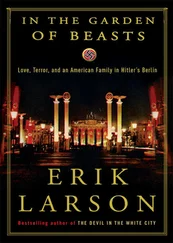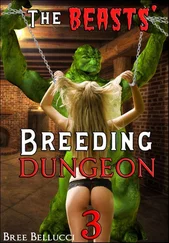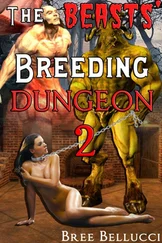Hawk rose in great circles around the climbing woodcock. Far faster and stronger, he outflew it easily, but must gain sufficient altitude for a second stoop. They were only marks in the sky, but their geometry was clear to Sten, who shaded his eyes with the big glove he wore, to see.
“He’s beaten, look!” Loren cried. “Look!”
The woodcock was losing altitude, dropping, exhausted, raking off. Beaten in the air, it was trying for cover again, falling fatally beneath the hawk, who gathered above it. There was a line of trees at the pasture edge and the woodcock plummeted toward it; but it was doomed. Sten wondered, in a moment of cold clarity, what the woodcock felt. Terror only? What?
It was close to the line of woods when the falcon exploded above it, transforming himself, with a wing noise they could hear, from bullet into ax. His foot struck the woodcock with the certainty of a million generations, killing it instantly. He bore it to the ground, leaving a cloud of fine feathers floating in the path they had taken.
Sten came close carefully, his heart hard and elated, his throat raw from panting in the cold air. Hawk tore at the woodcock, a bleeding bolus of brown plumage, needle beak open. Sten stood over them and his mouth was suddenly full of water. He fumbled in his pocket for the lure. “Should I lure him off?”
“Yes,” Loren said.
Hawk turned from breaking the cock’s pinion to look up at Sten. He mantled, not wanting to rise to the fist, but greeting Sten; rejoicing, Sten tried not to think, in his master. Then he cocked his liquid eye at the woodcock, and with foot and beak returned to it. His bells made sounds as he worked. Unwillingly, not wanting to spoil Hawk’s enjoyment, but knowing he must, Sten took out the lure. He looked to Mika where she held the horses, and to Loren, who watched the dogs. “Hawk,” he said, all he could think to say. “Hawk.”
On the ride home, he let Loren carry the falcon, because his arm had begun to tremble with the weight, but he walked nearby, leading his horse, letting Mika chase on ahead. When they came near the farmhouse, they saw Mika looking out to the weedy road that went past the house and farther on joined the gravel drive up to the mansion. A slim black three-wheeler had come off the road and was approaching. It slowed as it came near them, seemed to consider stopping, but then didn’t. It picked up speed silently and turned onto the elm-shaded drive toward the mansion.
“Was that that counselor?” Mika asked.
“I guess,” Sten said.
“What did he want here? Anyway, he’s not allowed.”
“Why not? Maybe he is, Isn’t it only other people who can’t come in? If he’s not exactly people…”
“He’s not allowed.” For some reason, not cold, though her begs were bare beneath leather shorts, Mika shivered.
The counselor wore an inverness cape because ordinary coats, even if they could be made to fit him, only emphasized his strangeness. His chauffeur opened the door of the three-wheeler’s tiny passenger compartment and helped him out; he spoke quietly to the chauffeur for a moment and on tiny feet started up the broad stairs of the house, helping himself with a stick. The guards at the door neither stopped him non saluted him, though they did stare. They had been instructed that it wasn’t protocol to salute him; he wasn’t, officially, a member of the Autonomy’s government. They didn’t stop him because he was unmistakable, there were no two of him in this world, and that also was why they stared.
Inside the mansion it was dim, which suited his eyes. He indicated to the servant who met him that he would retain cape and stick, and he was led down several halls to the center of the house.
Halls fascinated him. He enjoyed their odors of passage, their furniture no one ever used, their pictures not meant to be looked at — in this case, fox hunting in long-past centuries in all its aspects, at least from the hunter’s point of view. He didn’t mind when he was asked, with reserved apology, to wait for a moment in another hall. He sat on a hard chair and contemplated a black, sealed jar that stood on a — what? sideboard? cornmode? — and wondered what if anything it was pretending to be for.
The Director’s appointments secretary, a woman of a certain lean nervosity common in powerful subordinates, greeted him without discernible emotion and bed him through old, glossy double doors that had new metal eyes in them; past her own high-piled desk; across another metal thing set in the threshold of an arch; and into the Director’s presence.
Hello, Isengrim, Reynard thought. He didn’t say it. He made some conventional compliment, his voice thin and rasping like fine sandpaper drawn across steel.
“Thank you,” the Director said, standing. “I thought it would be better to meet here, I hope I haven’t inconvenienced you.”
Janrell Gregorius’s voice was still faintly accented; he had learned English only as a schoolboy, when his father — whose portrait stood with the children’s on an otherwise impersonally naked desk — came here with the international commission that had tried to arbitrate the partition. The commission had of course failed, though the idea of Autonomies remained, unlike as they were to the commission’s complex suggestions. When the Malagasian member was kidnapped and executed, and it became obvious that the Autonomies were becoming, inevitably, disputing nations, the commission had disbanded, and Lauri Gregorius had gone home to ski, leaving them to their madness. Jarnell — Jarl as he had been christened — stayed. The portrait on his desk was twenty years old.
“Will you take something? Lunch? A drink?”
“Early for both in my case.”
“I’m sorry if we’ve called you too early.”
Reynard sat, though the Director had not. It was among his privileges to be unbound by politenesses and protocol; people always assumed he couldn’t understand them, didn’t grasp the subtleties of human intercourse. They were wrong. “It’s difficult to believe that any nocturnalism would have survived in me. But there it is. You can’t have government solely at night.”
“Coffee then.”
“If convenient.” He nested his red-haired tiny hands on the head of the stick between his knees. “I passed your children on my way up from the gate.”
“Yes?”
“Someone, an adult, with them, with a bird on his wrist.”
“A Mr. Casaubon. Their tutor.”
“Beautiful children. The famous son resembles you as much as they say. Wasn’t there a film…”
“A tape. I’m glad they’re here now; the boy, I think, was beginning to be affected by the publicity. Here he can live a normal life.”
“Ah.”
“The girl has a different mother. Puerto Rican. She’s only come to live here in the last — what? — eighteen months?” He had been pacing steadily in front of the tall windows seamed with metal that looked out toward raw concrete bunkers where men in Blue lounged. Gregorius would have looked well in Blue; its pure azure would have just set off his flawless, windburned skin and tawny hair. Instead, he wore black, noncommittal, well-tailored, somewhat abashing. “How,” he said, “are we to behave today? Can we begin that way? The USE people will be here shortly.”
“Will they bring the safe-conduct?”
“They say they will.”
“And under what circumstances will they hand it over?”
“On receipt of a signed affidavit of mine endorsing the general aims of the Reunification Conference.”
“As interpreted by USE.”
“Of course.”
“And you’ll sign it?”
“I have no choice. USE’s bargain with the Federal is that USE will accept the terms of reunification the conference arrives at, if USE can issue these safe-conducts.”
Читать дальше
